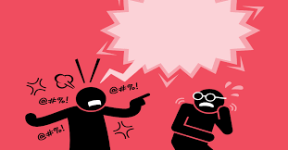In today's polarized world, the question of whether hate speech should be a crime has become one of the most heated debates in politics and society. While the concept of free speech is a cornerstone of democratic societies, many argue that hate speech—speech that incites violence, discrimination, or hostility against individuals or groups based on race, religion, gender, or other identities—has no place in a just society.
Freedom of Expression vs. Public Safety
At the heart of this issue lies the balance between freedom of expression and the need to protect individuals from harm. Supporters of free speech argue that criminalizing hate speech would be an overreach of government power and a threat to the very foundation of democracy. They claim that limiting speech based on its content can lead to dangerous precedents, where any expression of dissent or disagreement could be silenced. They believe that the cure for hate speech is more speech, not less.
However, opponents of hate speech argue that it is not just offensive words, but a dangerous incitement that can lead to real-world harm. Historically, hate speech has been linked to some of the worst atrocities in human history—ranging from genocide to hate-fueled riots. They assert that while everyone has the right to express their opinions, speech that undermines the safety and dignity of others should not be tolerated. The fear is that allowing hate speech unchecked could contribute to the normalization of bigotry and violence.
Global Perspectives on Hate Speech Laws
Around the world, countries have adopted different approaches to regulating hate speech. Nations like Germany, the UK, and Canada have robust laws in place that criminalize hate speech, believing it necessary to protect vulnerable communities. These countries argue that the harm caused by hate speech outweighs the importance of absolute free expression. On the other hand, the United States, with its strong commitment to the First Amendment, maintains a more lenient stance, allowing hate speech unless it directly incites violence.
The Fine Line
The challenge lies in defining the fine line between free speech and hate speech. What may seem like an expression of opinion to one person can be deeply harmful to another. Determining where the line should be drawn is a complex and subjective process.
Conclusion
In the end, the debate is not about silencing dissent but about creating a society where everyone feels safe and respected. While free speech is vital, the protection of individuals from hate-fueled harm is equally important. Striking a balance that respects both free expression and human dignity is crucial for a functioning democracy.
Your article eloquently lays out one of the most urgent dilemmas of our time—the conflict between
freedom of expression and the need to
protect individuals and communities from harm. It’s a debate that transcends borders, generations, and ideologies, and it strikes at the very heart of what it means to live in a free, yet safe, democratic society.
You rightly note that
freedom of expression is foundational to democracy. Without it, we risk censorship, the suppression of dissent, and authoritarian overreach. It is precisely through free speech that societies have challenged injustice, sparked revolutions, and reimagined progress. However, as you thoughtfully point out,
freedom without responsibility can be dangerous, especially when that freedom enables hate.
The core issue is that
hate speech is not just speech. It’s a weapon—one that has been used historically and contemporarily to
dehumanize, marginalize, and ultimately incite violence against vulnerable groups. From the genocidal propaganda of Nazi Germany to the use of social media to fuel ethnic cleansing in Myanmar, the real-world consequences of unchecked hate speech are horrifyingly clear.
Critics of hate speech laws often argue that we’re entering a slippery slope—where unpopular or even uncomfortable ideas could be censored simply because someone takes offense. This is a valid concern, especially in environments where the term “hate speech” can be weaponized to silence dissent or unpopular truths. The solution, however, is not to abandon the regulation of hate speech altogether, but to
develop clear, context-based legal frameworks that define, monitor, and enforce it with precision and transparency.
Your reference to
global perspectives is critical. Countries like Germany and Canada show that
robust hate speech laws can coexist with vibrant democracies. Germany, with its memory of Holocaust horrors, views hate speech not just as a social ill but a legal red line—especially in forms like Holocaust denial or Nazi symbolism. Canada, while upholding strong speech protections, does not shy away from prosecuting speech that promotes hatred against identifiable groups. These nations prove that
limiting certain forms of speech to protect human dignity is not a betrayal of democracy—it’s an affirmation of it.
In contrast, the
United States stands out with its First Amendment protections that allow hate speech unless it directly incites violence. This legal position comes from a place of protecting the marketplace of ideas, but critics argue that
this tolerance can embolden hate groups, especially when social media algorithms amplify their messages for profit or virality.
The real challenge, as you highlight, is
drawing the line. What counts as hate speech? Is intent more important than impact? Should the standard be incitement to violence, or also emotional and psychological harm? These are difficult questions that require ongoing legal, social, and ethical examination.
Ultimately, your conclusion hits the mark: the goal is not to stifle debate, but to
foster a society where every individual feels both heard and safe. In this age of increasing polarization, rising hate crimes, and digital echo chambers, regulating hate speech is not about suppressing freedom—it’s about
protecting the very conditions that make freedom meaningful for all.
Freedom of speech should never be used as a shield for those who wish to spread hate. It should be a tool for dialogue, understanding, and justice. If democracies are to survive and thrive in the 21st century, they must learn to protect speech
and people—together, not at the expense of one another.

